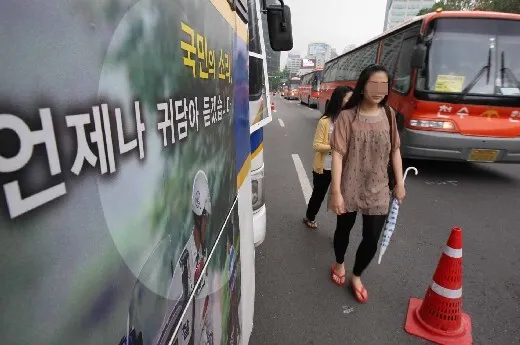hankyoreh
Links to other country sites 다른 나라 사이트 링크
Police ban assemblies of Lee administration’s critics

It has been discovered that Lee Myung-bak’s administration has banned assemblies by civic and social groups critical of government policy.
The Hankyoreh obtained an assembly permit information on Wednesday following an information disclosure request to the Seoul Metropolitan Police Agency, and discovered a total of 294 cases between February 2008 and April 2009 where groups who had submitted prior notice of assemblies within Seoul subsequently received notices that the assemblies had been denied or banned. In 182 of these cases, 62 percent, the assemblies were related to current political issues. Of these cases, notices had been submitted by the Korean Confederation of Trade Unions (KCTU, Minju Nochong), the Democratic Labor Party (DLP), the People’s Council for Countermeasures against Mad Cow Disease, the People’s Committee to Protest Against the Murderous Clampdown on the Yongsan Evictees, Jinbo Corea and other civic groups. During the period in question, more than 60,000 notices had been filed for assemblies in Seoul. Applications for permits or notification prior to holding parades, assemblies or demonstrations are required in South Korea.
Of the groups reporting assemblies, the DLP received 55 or the most ban notices, including one for its “rally to denounce the anti-public welfare, anti-democracy MB administration.” The KCTU and its member unions came second for receiving a total of 53 bans, among them one for a KCTU-planned assembly for “anti-neo-liberalism and anti-Lee Myung-bak coordinated action.” Whang Sun-won, head of Jinbo Corea’s democracy and human rights bureau, said, “Since last year’s candlelight vigil demonstrations, 100 percent of the assemblies in urban centers planned by progressive groups critical of government policy like ‘MB bad laws’ or the Four Major Rivers Restoration Project have been banned.”
Jinbo Corea, the Corea Youth Movement Council, the DLP and other groups filed reports for holding a “rally to denounce the anti-public welfare, anti-democracy MB administration,” which would have involved assemblies in more than 60 sites in Seoul, including major subway stations, between December 21 of last year and January 17. All of the assemblies were banned.
In contrast, only one case occurred where an assembly favorable to government policy was banned. The “assembly to urge ratification of the South Korea-U.S. Free Trade Agreement and membership in the Proliferation Security Initiative,” sponsored by the Korean Parents’ Association, was prohibited because of a location conflict.
Police most frequently cited “location conflict” as grounds for banning assemblies, meaning that other assemblies had already been reported for the requested site. Location conflict accounted for 141 cases, 48 percent, followed by 78 cases of “traffic obstruction,” and 46 cases of “threats to public order.”
“The reasons cited by police serve merely as pretexts,” said Whang. “Even if there are two or more assemblies overlapping in one place, the police can maintain order in the middle to facilitate the assemblies to take place in a peaceful manner, and if traffic flow is a problem, they can simply adjust the time and number of people who can take part in the assembly.”
Civic and social groups are also pointing to the arbitrary standards police apply as a problem. In particular, they take issues with the assemblies that are banned by police as representing a “threat to public order,” meaning that it has been determined that they could escalate into illegal actions or violence. Assemblies based on these grounds included an assembly by the Supporters of Hwang Woo-suk urging the resumption of the disgraced doctor’s research activity, tuition-related assemblies by the Korean Student Federation, and protests by the socially disadvantaged, including Solidarity Against Disability Discrimination, and even included history education assemblies by the Campaign for Accurate Information on the Pro-Japanese New Right and the Citizens’ Association for Proper History Education.
“During the Roh Moo-hyun administration, police considered the positions of civic groups, exercised the law with flexibility and tended to guarantee freedoms of assembly and demonstration,” said An Jin-geol, head of the society and economy department at People’s Solidarity for Participatory Democracy. “Recently, they have even been suppressing press conferences within the four main gates of Seoul’s city center, regarding them as assemblies,” An added.
Please direct questions or comments to [englishhani@hani.co.kr]
Editorial・opinion
![[Column] Imperial tyranny, Korean humiliation [Column] Imperial tyranny, Korean humiliation](https://flexible.img.hani.co.kr/flexible/normal/500/300/imgdb/original/2025/0912/7617576652278449.jpg) [Column] Imperial tyranny, Korean humiliation
[Column] Imperial tyranny, Korean humiliation![[Correspondent’s column] Cognitive dissonance in MAGA world [Correspondent’s column] Cognitive dissonance in MAGA world](https://flexible.img.hani.co.kr/flexible/normal/500/300/imgdb/original/2025/0912/3417576648512186.jpg) [Correspondent’s column] Cognitive dissonance in MAGA world
[Correspondent’s column] Cognitive dissonance in MAGA world- [Editorial] Korea, US need a ‘gentlemen’s agreement’ on what job creation entails
- [Column] Why MAGA has its eyes set on Korea
- [Column] Lee still has his work cut out for him after summit with Trump
- [Editorial] Is this any way for the US to treat an ally?
- [Column] Lee’s difficult task of striking a balance on Japan
- [Editorial] Multipolar era means Seoul must broaden its diplomacy
- [Column] North and South Korea are no longer pawns in US-China-Russia relations
- [Column] Who we fail when we oversimplify the ‘comfort women’ issue
Most viewed articles
- 1Seoul says US must fix its visa system if it wants Korea’s investments
- 2North Korea said to have exposed numerous US spies after botched 2019 SEAL mission
- 3[Column] Imperial tyranny, Korean humiliation
- 4Freed workers arrive in Korea, one week after ICE raid in Georgia
- 5Korea’s president says firms will be ‘very hesitant’ about investing in US after ICE raid
- 6[Correspondent’s column] Cognitive dissonance in MAGA world
- 7Son of ex-President Roh Tae-woo tapped to serve as ambassador to China
- 8MAGA’s traveling circus comes to Korea
- 9[Column] Why MAGA has its eyes set on Korea
- 10Lee says he won’t sign any tariff deal with US that doesn’t benefit Korea